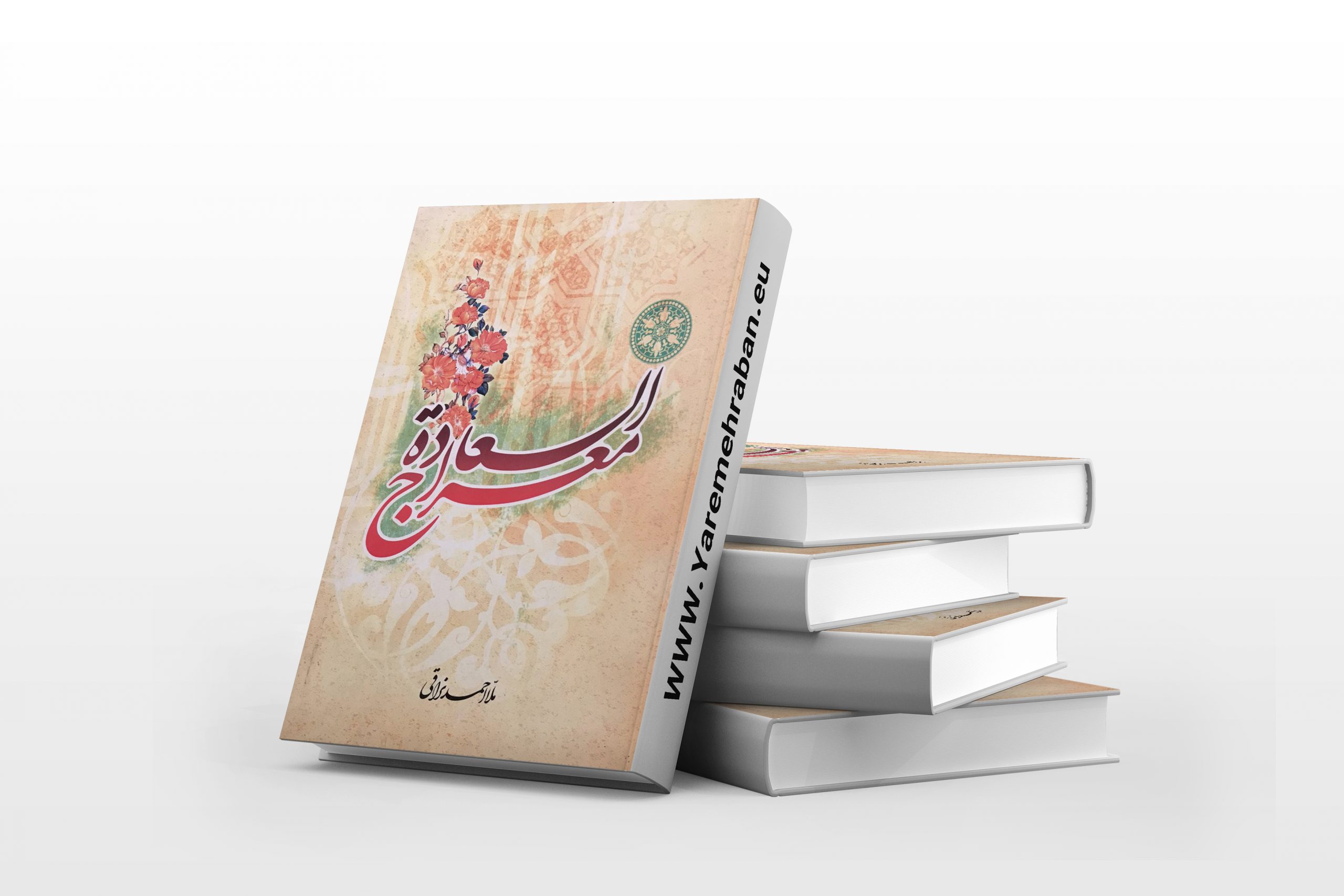Description
Ascension of Happiness is a book on Islamic ethics by Mullah Ahmad Fazel Naraqi. This book is a summary and Persian translation of the comprehensive Arabic book Al-Saadat by Mullah Mehdi Naraghi, the author’s father. As Mohammad Hassan Qazvini has summarized the same comprehensive Al-Saadat in Arabic and named it Kashf al-Ghatta ‘on the aspects of Al-Ihtada ceremony. Me’raj al-Sa’ada has been simplified for the understanding of ordinary people and many things have been added to it.
Mullah Ahmad Naraghi was born in the year (1185 AH) in the city of Naragh, one of the functions of Kashan city. He studied the basics and most of the intermediate and advanced courses in the presence of his scientist father, the late Mullah Mehdi Naraqi.
The year (1205 AH) when twenty springs passed from his life, he emigrated with his father to the city of science and wisdom, Najaf Ashraf, where he used the seminary of the great scholar Vahid Behbahani for some time; But shortly after that year, Master Vahid Behbahani joined the mercy of God and he returned to his hometown of Naraq with his father. Only four years had passed since the death of his master, when Mullah Ahmad lost his father, Mullah Mahdi, in the year (1209 AH); The father of the thinker from whom he had inherited most of his scientific savings.
Table of Contents of the Book of Ascension
A look at the life of the wise scholar of the late Mullah Ahmad Naraqi
Birth and education
Children of the late Naraqi
Social mission (reference with insight)
The political situation in Iran
Ruling on Jihad
In the stronghold of jihad
On the cultural front
Dealing with the rulers of Jor
Professors of the late Naraqi
His disciples
Writings of the late Naraqi
Dynamics in thought
Absolute clerical rule
Justice of the rulers
Positive asceticism
Departure
Chapter One
In the expression of some beneficial preliminaries, from the expression of the states of the soul
And the benefit of moral virtues and the harm of its vices
Chapter One: Knowing the Soul, Introduction to Knowing God
The effect of self-knowledge on moral refinement
Chapter Two: The Combination of Man from Body and Soul
Chapter 3: The way of knowing the soul
Chapter 4: Truth and Human Nature
Chapter Five: Journey to the High World with a Spiritual Aspect
Chapter Six: Pleasure and knowledge of body and soul
Chapter 7: The evils of mental illness and the benefits of its correctness
Science without cultivation is not science
Paying attention to the health of the body and neglecting the health of the soul
Chapter 8: Acquisition of psychic properties by repeating deeds
Chapter 9: The benefits of ethics and its superiority over other sciences
Chapter Ten: Refinement of Ethics and Its Fruits
Who is Saeed Motlagh?
Chapter Two
Due to the deviation of morality from the good road
And the attainment of morality and the expression of the powers of the human soul
Chapter One: The Four Powers and the Subordination of Other Powers to Them
Four colonels
The power of reason
Chapter Two: Pleasure and Knowledge of the Four Powers
Pleasures are not limited to the pleasures of the body
Trying to dominate the power of reason over other powers
Chapter Three: The Four Powers, the Source of Goods and Evils
Chapter 4: The power of reason is the perception of generalities, and the power of illusion is the perception of details.
Chapter Five: The Employer of the Four Forces
Chapter Six: The Goods of Vicious Traits
Chapter 7: The juxtaposition of the attributes of utopia and the attributes of vice
Chapter 8: Suspicion of vile traits to good traits
Chapter Three
In expressing the protection of good morals from going beyond moderation, and treatments
Chapter One: Maintaining the Balance of Good Morality
The similarity of ethics with medicine
Chapter Two: Introduction to Self-Cultivation
Chapter Three: Diagnosis of Mental Illness
Causes of mental illness
The way to cure mental illness
Chapter Four
In detailing the types of ethics and expressing the honor of the virtues and the quality of the acquisition of each,
Good and complementary ethics, and their benefits and corruptions
First place
Justice
Chapter One: In stating what pertains to the power of the agent
Types and degrees of justice
Chapter Two: Types of Justice
Chapter 3: Justice, the source of perfection and happiness
Chapter Four: Attribution of the Reformer to Justice
second place
In expressing the ethical treatment of attachments
Which belongs to the power of reason
First point: in expressing the two kinds of vices and their opposites
Chapter Five: Wisdom vs. Wisdom and Ignorance (Knowledge of the Truths of Things)
The honor and virtue of science and scholars
Etiquette and conditions of teaching and learning
Teaching etiquette
In studying the science of principles of beliefs
Avoiding sins causes Jazem to believe
Indoctrination of translating ideas to children
Objective obligation of the science of ethics
Science, the prelude to action
Second point: In expressing other types of vices which are caused by the two mentioned sexes, namely germs and simple ignorance, and which belong to the power of reason.
multiplex ignorance
Doubt and astonishment
Certainty and at least its levels
Signs of a certainty
Degree of certainty
Shirk and its types
Chapter: Monotheism and its types
Levels of monotheism and its effects
Chapter: Signs of progress in the levels of monotheism
Chapter: Familiarity with the secrets of property and kingdom
The fourth attribute: psychic thoughts and evil temptations
Thoughts that occupy the heart
Chapter: Types of Inspiration and Temptation and Their Signs
Chapter: The harms of evil temptations and carnal thoughts
Chapter: Treatment of mental illness
Ignoring God causes the temptation of Satan
Heart remembrance prevents temptations and memories
Benefit: The quality of the barrier of memories and elimination of temptations
Chapter: Mahmoud’s thoughts and thoughts and their types
The light of the unrelated darkness of many events and steps
Divine judgment in the creation of mosquitoes and bees
The power of truth in the creation of man
Thinking about the bones and arteries of the body
Meditation on the wonders of the scalp
A look at the secrets of the eye and its role
Wonders of the ear
The hidden wisdom in the human face
Wonders of the body’s digestive system
The wonders of the creation of the human heart
A look at how the hands and fingers were created
The special composition for the creation of the human foot
Divine preparations for the birth and growth of the baby
The role of imagination, fear and wisdom
Horizontal verses: Seeing the power of God on earth
Wonders of the mountains
Types of plants and their benefits
Trees and their flowering
Animal guilds
Thinking about the creation of space and celestial spheres
The greatness of the heavens
Thinking about your actions and deeds
Cunning
How to get rid of cunning
Third place
Expressing the attributes of vice and morality of Jamileh
Which belongs to the power of anger, arrogance and cowardice
Fear and its types
Fear of condemnation
Causes of fear of death
Chapter: Assurance of the heart and how to study it
Safety from the plot of God
1. The cause of safety from the plot of God
2. Fear of God and its types
3. Abominations that are the source of fear and dread
Fear of misfortune
4. Fear of God, the highest degree of fear
5. The quality of learning the attribute of fear of God (جَلَّ جَلالُهُ)
The reason for not being afraid of ending
The way to protect the heart from sins at the time of death
The book “Ascension of Happiness” is the work of Islamic jurist Mullah Ahmad Naraqi (1185-1245 AH) on Islamic ethics. This book is a summary and Persian translation of the comprehensive Arabic book Al-Saadat by Mullah Mehdi Naraghi, the author’s father. The language of this work is simple and written for ordinary people.
Many works of the late Mullah Ahmad Naraghi are remembered, most of which have been published many times.
The compositions and writings of the late Naraghi have been introduced in various sources up to 23 titles and according to the signature of the late Naraghi, the writings of the late Naraghi will reach 18 volumes by 1228 AH, ie the time of its writing.
Mullah Ahmad Naraqi is one of those Shiite jurists who created a great jurisprudential and cultural revolution throughout history with new and dynamic thoughts and ideas, and guaranteed and proved the efficiency of Shiite jurisprudence and the efficiency of Islam and Shiism forever, and for this reason. They also remained alive and immortal in history.
The art of Mullah Ahmad Naraghi was to enter the dangerous field of ijtihad and jurisprudence with unparalleled sharpness and courage and with a new vision of the government, and to save this deep-rooted and original issue from dispersal and to give it cohesion, strength and dynamism. With a jurisprudential effort, he deduced the category of “Velayat-e-Faqih” from the lab of jurisprudential, principled and theological texts and extracted it and for the first time turned it into a principle, basis, basis and rule and delivered it to the Islamic society.
The book of Ascension has five chapters:
Chapter One: In expressing some beneficial preliminaries, from expressing the states of the soul and the benefit of moral virtues and the harm of its vices;
Chapter Two: Due to the deviation of morality from the good path and the attainment of morality and the expression of the powers of the human soul;
Chapter 3: In expressing the protection of good morals from going beyond moderation, and the treatment of the kidneys in removing the obligations of morality and circumstances, from what is not assigned to certain attributes and actions, and what is related to this;
Chapter 4: In detailing the types of ethics and expressing the honor of the virtues and the quality of the acquisition of each, and describing the corruptions of the vices and expressing the cure of the characteristics of each of them;
Chapter Five: Secrets and Rites of Worship.
1- Introducing the book on YouTube
2- Introducing the book in Aparat



Reviews
There are no reviews yet.